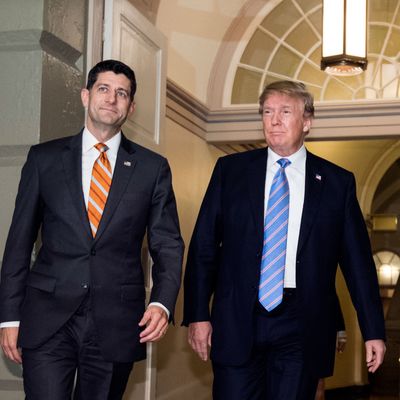
Asked by reporters if the chamber he leads would introduce a bill to scale back the president’s power to levy tariffs, House Speaker Paul Ryan brushed aside the idea as an impossibility. “You would have to pass a law saying ‘don’t raise those tariffs’ and the president would have to sign that law,” he said. “That’s not going to happen.”
That would come as a surprise to the drafters of the Constitution, who created a mechanism for exactly such a scenario. Trump doesn’t actually have to sign a law for it to take effect. A presidential veto can be overridden by a two-thirds supermajority in both chambers. Look it up, it’s true! But Ryan is helpfully demonstrating why many aspects of the Constitution do not work as designed, or at all.
The Constitution was built on the premise that the branches of government would compete with each other and guard their own power. One of its conceptual flaws was a failure to imagine political parties, which can effectively subordinate one branch to the other. The problem has been ongoing for more than two centuries, but perhaps no pair of figures in American history have dramatized the contradiction quite as blatantly as Ryan and Donald Trump.
Trump, for his part, has given Congress more legitimate reasons to exercise its independent authority than any modern president. He shreds governing norms daily, including by operating a business empire largely in secret that intertwines his self-interest with that of the public, by attempting to subvert the independence of federal law enforcement, and through wanton incompetence. Ryan has abdicated the oversight function entirely. Indeed, his chamber is instead joining Trump’s effort to turn the Department of Justice into Trump’s personal rent-a-cops.
The tariff question is especially striking. For one thing, Trump is acting in flagrant defiance of long-standing Republican party dogma, which has for better or worse endorsed free trade as an unmitigated good. For another, Trump is exploiting a legal loophole. Congress normally has to approve changes in taxes, which a tariff is. But a 1962 law gave presidents the authority to levy tariffs for national security reasons. The intent was to protect vital resources related to the military. Unwisely, though, Congress failed to set any parameters on this authority, and Trump is using it for manifestly non-security reasons.
Because the foreign governments attacked by Trump in his trade war are smart, they have imposed countermeasures specifically targeted at Republican constituencies. The overall hit to the U.S. economy is relatively small and uncertain, perhaps about 0.3-0.4 percent of gross domestic product. But for soybean growers, or motorcycle manufacturers, or other Republican business owners, the pain is massive.
But what these foreign governments assume is that Congress retains the willpower to function independently, a premise Ryan has spent the last year and a half subverting daily. There is almost no reason to believe anything more than a minuscule proportion of Congress actually supports Trump’s trade war. For Congress to set some limit on the tariff authority it mistakenly handed over to the president 56 years ago would be a meager assertion of authority. But even such a step remains unthinkable in a political world in which Paul Ryan acts exactly like a man who views the president of the United States as his boss.






























